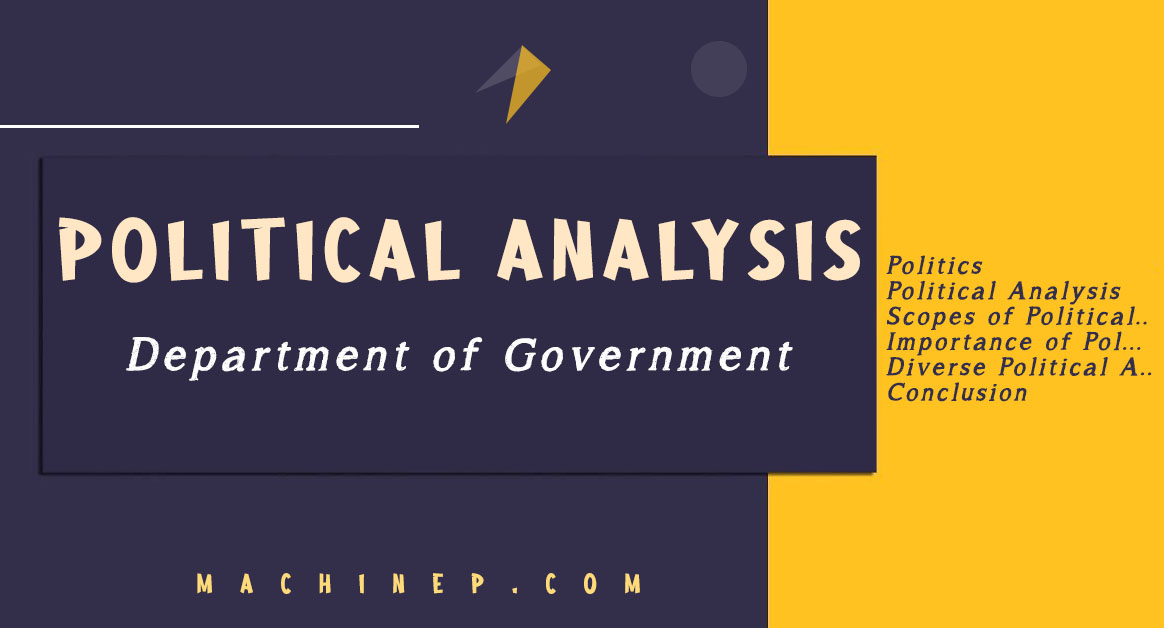Introduction
Political Analysis simply means any systematic attempt to understand, examine, evaluate as well as explain any form of political phenomena by first breaking them down into conceptual parts to make sense of the interplay between its associated variables.
In other words, political analysis is the act of breaking any political element down into parts in other to study or get full knowledge of the element as a whole.
For a clearer and more coherent understanding of the meaning and principles of political analysis, it is pertinent to clarify the major concepts in this discourse such as ‘politics’ and ‘analysis’.
What is Politics?
Politics simply refers to a set of activities associated with the official governance of a state, country, or any geographical area. It involves making decisions (by the decision-making body) that apply to members of a group.
Politics also refers to achieving and exercising positions of governance which entails an organized control over a human community such as a state. The academic study focusing on just politics, which is, therefore, more targeted than general political science, is sometimes referred to as politology. For any activity to be said to be ‘political’, it must in essence involve some elements of politics.
Some scholars have identified the origin of the concept with the term, “polis” as used to identify the organization of the city-state of Athens in early Greece. Politics from the Greek word “politikos” means “of, for, or relating to citizens. It is the practice and theory of influencing others from the “affairs of the city” itself.
Polis directly relates to the term “city” while the term ‘politics’ relates to the “citizens”. Drawing from the later expression, one could easily deduce or conclude that politics relates to the city affairs of the citizens, which in ancient Greece was considered a city-state or the “pouty”.
Politics exists whenever there is a relationship exhibiting control of power, authority, influence, and conflict. It is never practiced by man in isolation (government and politics can never exist without the existence of man). Politics can, therefore, be said to be an art of resolving contradictions or conflicts to serve human socio-economic interests.
What is Analysis?
An analysis simply means the ‘breaking up’ or ‘separation’ of a whole into parts”, “an examination of a complex, its element and their relations” for the examiner to fully comprehend and explain it. Simply stated, an analysis could be the systematic process of assessing to unravel the unknown from the known and the hidden from the observable.
What is Political Analysis?
Political analysis is simply a systematic attempt at understanding, examining, evaluating as well as explaining political phenomena by first breaking them into conceptual parts to make sense of the interplay between their associated variables.
Just as the name implies, political analysis is an attempt to examine to understand political phenomena by bringing them into deep scrutiny which must be systematic and objective.
The basic concept of Political analysis is all about analyzing some political issue or phenomena in a given country. For instance, the issue of the terrorist sect (Boko Haram) in Nigeria, activities of herdsmen in Nigeria, unemployment, kidnapping, armed robbery, IPOB, the ISIS case, and many other politically oriented issues.
In any attempt to examine these issues by breaking them into micro parts, one ends up in political analysis.
The political analysis first requires understanding and accepting that the phenomena to be analyzed have some political manifestation, that is exhibit some element of politics.
Again, Political analysis could be seen as a process of dis-aggregating the key players in the policy environment, identifying how they influence that environment and related variables.
Scope of Political Analysis
Any attempt to comprehend the scope of the political analysis must come to terms with several questions inherent in the subject matter of politics itself which are mainly the concern of political science. For instance;
- What is the role of power like the political structure established by different political systems?
- What is the prerequisite condition of stability in a political system?
- What is the essence of the idea or theory that “a government that governs the least governs the best”?
- When must citizens obey or refuse to obey the state?
- What aspect of federalism makes its practice in some societies difficult?
The scope of the political analysis must raise contemporary issues that the academy of political science must necessarily deal with. It may raise the following questions;
- What attitudes and values produce political conflicts?
- What is the nature of the socio-economic relationship inside a polity?
- What political organization is active in the struggle to achieve political consensus?
As one reflects on these questions as outlined above, one momentarily begins to appreciate the essence of political analysis.
Importance of Political Analysis
Political analysis is important because political issues that occupy government and society are many, varied, and also complex.
Political analysis is important because when a phenomenon formulates appropriate policies needed for the smooth running of government when complex issues are properly analyzed, their solutions are proffered by the analysts to policymakers to use in their planning and execution of public policy.
Without political analysis, most problems faced by various governments will remain unsolved. Therefore, political analysis helps us to understand our world better and to make intelligent or educated decisions for the benefit of man in his society.
Diverse Political analysis
A political analysis could come into play in most policy-making environments and hence may not pertain just to the field of politics but also is an often-used term in marketing and related fields.
What we can refer to as a “political system” is usually very dynamic and rarely static. Political analysis is mostly about assigning reasons for the changes that these researchers observe. Some studies in this area also describe “what if?” scenarios using existing facts and workable assumptions. Political scientists are quite skeptical! They conduct studies questioning analyses and debating hypotheses.
The conclusions from political analyses influence strategies being formulated; any strategy being formulated for a company, or even for the government.
Conclusion
However, since no one can completely be immune from the effects of politics, a political analysis makes it possible for people to make rational choices and decisions. To free themselves from the negative and often painful consequences of political actions of political actors in a given political system.





I really love your website.. Pleasant colors & theme.
Did you develop this website yourself? Please reply back as I’m
planning to create my own blog and want to find out where you got this from
or what the theme is named. Kudos!
Hey there, you have done a great job.
An excellent read. I will certainly be back.